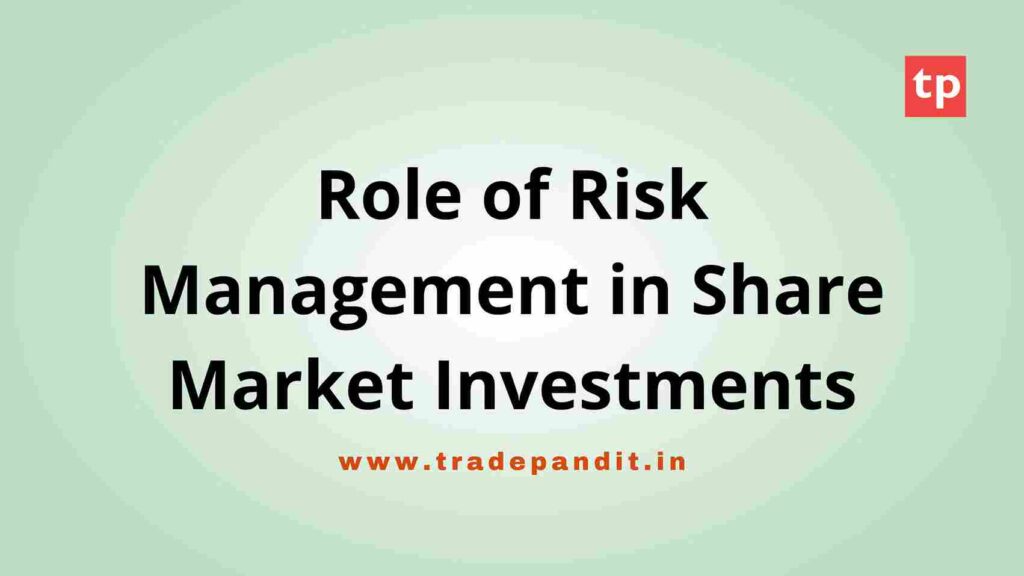Profit and loss are part of the Share market therefore The Role of Risk Management in Share Market Investments become very important and plays a crucial role in share market investments. In this article, we will explore the role of risk management in share market investments and why it’s essential for any investor looking to navigate the complexities of the financial markets.
There are two main Exchange in India, the Bombay Stock Exchange (BSE) and the National Stock Exchange (NSE)

Understanding Share Market Investments
Before investing in the share market, we have to understand what is share market is and also understand what is advantages and disadvantages of the share market are. Before starting to invest in the share market you should have a demat account. So you can try India’s most reputable stock broker for a demat account.
What is the Share Market?
The share market, also known as the stock market, is a dynamic marketplace where individuals and institutions buy and sell ownership shares of publicly traded companies. It serves as a platform for capital to flow between investors and companies, and it plays a pivotal role in the global economy.
The Appeal of Share Market Investments
Share market investments offer the potential for significant returns over time. Investors can benefit from capital appreciation as stock prices rise and may also receive dividends. However, along with these opportunities come inherent risks that can lead to financial losses.
The Importance of Risk Management In Share Market Investment
The Inherent Risks of Share Market Investments
Share market investments are associated with various risks, including market volatility, economic factors, and company-specific issues. Market prices can fluctuate rapidly, and unexpected events can lead to substantial losses.
The Role of Risk Management In the Stock Market
Risk management is the process of identifying, assessing, and mitigating potential risks to protect your investment capital. It’s a proactive approach that allows investors to navigate the uncertainties of the share market while aiming for long-term growth.

Strategies for Effective Risk Management
Diversification Of Investments
Diversification is a fundamental risk management strategy. It includes spreading your speculations across various resource classes, businesses, and geographic areas. By not putting all your eggs in one basket, you can reduce the impact of poor performance in a single investment.
Trade With Stop-Loss
Stop-loss orders are predetermined price points at which you are willing to sell an investment to limit losses. They act as a safety net, automatically executing a sell order when the market reaches a specified level.
Setting Realistic Goals Or Return
Setting clear and realistic investment goals is crucial. Grasp your monetary goals, time skyline, and change resistance. This will help you make informed decisions and avoid impulsive actions based on emotions.
Staying Informed Before Investment
Knowledge is a powerful tool in risk management. Remain refreshed with market patterns, monetary news, and company advancements. Informed decisions are often more rational and less emotionally driven.
The Psychology of Risk Management In Share Market Investments
Emotions and Decision-Making Power
Feelings can cloud judgment and lead to rash activities. Fear and greed can influence investment decisions, often to the detriment of the investor. Effective risk management involves staying emotionally disciplined.
Discipline and Patience On Investment
Risk management requires discipline and patience. Stick to your investment strategy, even in turbulent times. Try not to make automatic responses to transient market changes.
Conclusion
In the world of share market investments, the risk is an inherent factor. That why the role of risk management in the share market are very important part of stock trading. However, the application of effective risk management strategies can significantly reduce the potential for losses and increase the likelihood of achieving your financial goals. By diversifying your portfolio, using stop-loss orders, setting realistic goals, staying informed, and mastering your emotions, you can navigate the share market with confidence and resilience.
FAQs
How do I assess my risk tolerance before investing in the share market?
Assess your risk tolerance by considering your financial goals, time horizon, and comfort with potential losses. A financial advisor can also help evaluate your risk tolerance.
What are some common mistakes to avoid in share market investments?
Common mistakes include not diversifying, trying to time the market, ignoring research, and letting emotions drive decisions.
Is it possible to eliminate all risks in share market investments?
No, it’s not possible to eliminate all risks, but effective risk management can help minimize them.
How can I stay updated with market trends and news?
Stay informed by following financial news outlets, reading reputable financial publications, and considering market research reports.
What role does diversification play in risk management?
Diversification spreads your investments across different assets, reducing the impact of poor performance in one area. It is a key strategy for managing risk in share market investments.
Image Credit Goes Freepik




